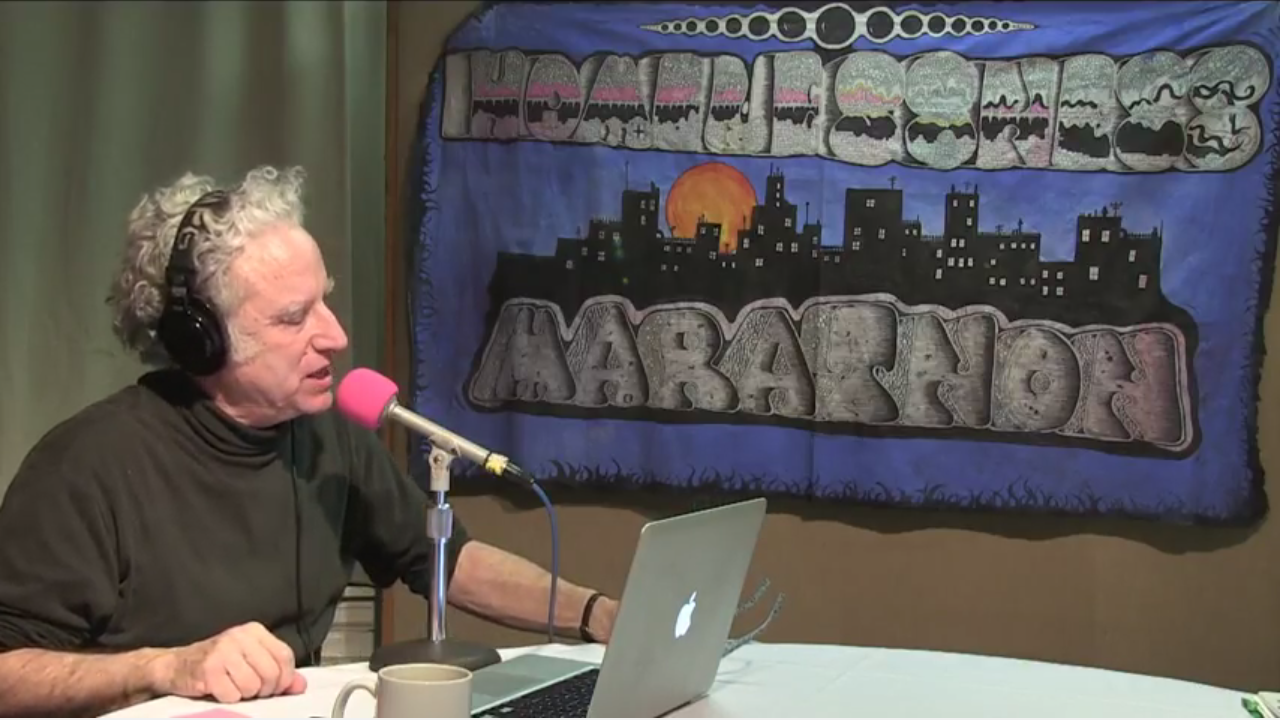Every year, for nineteen years, Jeremy Alderson has hosted the Homeless Radio Marathon. And every year, for nineteen years, Alderson has only seen the homelessness problem worsen.
“Hey everybody,” he began at 7 p.m. on the dot. “It’s me, Nobody, and welcome.”
He then lit a candle, as he does every year, in honor of the homeless who died in 2016.
“It’s only been getting worse, for decades,” Alderson said. “Even with the combined effect of all the homeless advocates we’re not making progress. People should understand that it gets more desperate every day.”
It is the ever-growing desperation that inspired Alderson, a retired radio personality from New York, to start the marathon back in 1998 and keep the Marathon running year after year. The first marathon was somewhat of a fluke—there was an empty block of time after Alderson’s regular broadcast, and his boss let him fill the time if he wanted. As Alderson had already been an advocate for homelessness, he took the time to spread awareness. The few people who heard the late-night show gave enough positive feedback to encourage Alderson to make the Marathon annual. In the past, the Marathon had recorded outside to show solidarity with the homeless. They would interview homeless people on the streets, giving the voiceless a microphone that reached 7, then 25, then 35 radio stations. This year’s Marathon, held on January 19, was recorded inside the WMPG studio in Portland, Maine, and broadcasted to more than 40 stations and live on on YouTube. Correspondents on the street gave a platform to homeless people from all over the country to talk to listeners from all over the world.
As the Marathon was held on the eve of the presidential inauguration, Donald Trump was on everyone’s mind. Alderson asked his guests what they would tell the President-to-be if they had the chance.
“The homeless are the most vulnerable,” said Randy on the air. “But you can’t legislate morality.”
The four-hour broadcast was filled with guests and covered a wide range of topics. Cheri Honkala, best known as the Green Party’s vice-presidential nominee in 2012, spoke about her time living as a homeless mother and aired concerns of homelessness no longer being a “trendy” thing to care about. Other guests included James Magaska Swan, a member of the Cheyenne River Sioux tribe, who spoke about native homelessness and members of the LA Poverty Department, a group of homeless and formerly homeless performance artists based out of Skid Row, Los Angeles.
Alderson kept returning to the idea that things were only getting worse for homeless people in the United States. He blames much of the worsening on politics.
“There’s a lot of political discourse on the vanishing of the middle class, but nobody seems to wonder what happens to the people who fall out of the middle class. They become the lower class,” Alderson said. “Once that safety net is shredded, the number of homeless people goes up. The political climate has gotten worse too. It’s been a long time since anyone’s talked about poverty. It’s not even a topic anymore. How big does the elephant in the room have to be? Does it have to be a stampede?”
Guests calling in were asked after their segment to say a few words to Trump, in case he happened to be listening. Most simply asked him to stick to his promises, to better the economy, and to pay more attention to the lower classes.
“Normal people don’t help. You must be creatively maladjusted,” Alderson said, paraphrasing Martin Luther King Junior just a few days after his birthday. “Most Americans are wonderful people—what could they do to help? They could give a dollar to someone they see on the street, or talk to them like a human being, or just give them a smile. We all have power to make someone feel better. Also, don’t vote for candidates who are not ready to change something in this country.”
Listen to and watch the 19th Annual Homeless Radio Marathon in full below.

Leave a Reply
You must be logged in to post a comment.